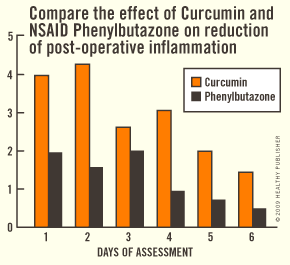For many years, people suffering from injuries or chronic pain have relied on non-steroidal anti-inflammatory drugs (NSAIDs) such as ibuprofen to bring relief. However, these medicines can have many side effects. Turmeric is a natural alternative that has been proven to be very effective for pain relief. Let’s take a look at how turmeric relieves pain and why you should choose it over NSAIDs when you need a pain reliever.
Turmeric Provides Natural Pain Relief

Turmeric’s ability to provide effective pain relief comes from a compound called curcumin, which occurs naturally in turmeric. This bioactive molecule not only gives turmeric its distinctive golden yellow color, but also reduces inflammation in the body by interfering with the processes that lead to inflammation. Soothing inflammation often leads to a reduction in pain. In fact, this anti-inflammatory mechanism is the same one that NSAIDs like ibuprofen use to bring pain relief.
Curcumin is found in several foods, including ginger, but turmeric is by far the richest natural source of this amazing bioactive molecule. Turmeric powder typically contains between two and four percent curcumin by weight. Consuming turmeric is a good way to get the curcumin you need for pain relief.
Turmeric Beats NSAIDs for Pain Relief
Many people assume that natural pain relief solutions like turmeric cannot possibly be as effective as synthetic drugs like ibuprofen or aspirin. However, a study published in The Journal of Alternative and Complementary Medicine found a surprising result: a trial involving over 100 people with primary knee osteoarthritis showed that turmeric provided more satisfactory pain relief than ibuprofen.
During the trial, patients were split randomly into two groups, one of which received 800 mg a day of ibuprofen, and another which received 2,000 mg of turmeric each day. The researchers measured how much pain people in each group had while walking and while going up and down stairs, and found that the people who took turmeric reported less pain and greater satisfaction with the treatment.

While more than 10 percent of people in the group receiving ibuprofen said they had little satisfaction with the treatment, not a single person receiving turmeric was unsatisfied with its pain-relieving effects. This astonishing result is a testament to the power of turmeric to relieve pain for people suffering from osteoarthritis.
Turmeric Could Be a Safer Choice Than NSAIDs
In 2005, the Food and Drug Administration (FDA) issued a warning that NSAIDs could increase the risk of having a stroke or heart attack. This serious side effect could make NSAIDs like ibuprofen unsafe for people who already have cardiovascular risk factors to take.
In addition to increasing the risk of heart attacks, NSAIDs also have many other potentially dangerous side effects. It is well known that they can increase the risk of gastrointestinal bleeding and trigger the development of stomach ulcers. This risk increases with the length of time that a person takes ibuprofen, which is concerning for people with chronic conditions like arthritis, who often rely on ibuprofen for long-term pain relief.
Aspirin is another common pain relief medication that doctors often recommend for treating painful conditions. While studies suggest that aspirin does not seem to pose the same health risks as ibuprofen, many people find that it is not as effective at treating the pain and inflammation associated with injuries. Therefore, aspirin may not be the most suitable choice for people whose pain interferes with their ability to live a healthy and happy life.
Does Turmeric Have Any Serious Side Effects and Safety Considerations?
Turmeric has been consumed for thousands of years in parts of the world like India, where it is routinely used in cooking. In general, experts consider turmeric to be safe to consume regularly over the long term, which means it could be a safe alternative to NSAIDs like ibuprofen and aspirin.
Some people taking high dose curcumin supplements, which contain more than 1,000 mg of curcumin, experience mild digestive problems, such as bloating. Some people have also reported skin rashes after taking more than 8,000 mg per day, but this side effect seems to be very rare and only present when taking very high doses of curcumin. In addition, some side effects may reduce as people keep taking the supplements.
Many people take turmeric regularly with no side effects at all, which is remarkable when compared to the number of people who experience side effects when taking ibuprofen or aspirin. Of course, anyone who is concerned about the side effects of turmeric or curcumin supplements should see their doctor right away for advice.
Medical sources stress the importance of taking pure turmeric, instead of relying on commercial turmeric powders which sometimes contain filler ingredients. Some turmeric powders designed for cooking contain fillers such as wheat or rye flour, which can cause food intolerance symptoms in some people. Low quality turmeric powders sometimes also contain food colorants, which can cause serious health problems when consumed in high doses. To avoid the risks of these filler ingredients, be sure to purchase high quality turmeric or curcumin supplements.
Turmeric Vs NSAIDs: Which Should You Use for Pain Relief?
When they experience pain as a result of an injury or illness, many people automatically reach for NSAIDs like ibuprofen or aspirin for pain relief. These medications are available in almost every drugstore and are conveniently packaged to provide pain relief. However, studies suggest that these medications may not be as effective, or as safe, as natural pain relief solutions like turmeric.
The decision over which treatment to use for pain relief is ultimately a personal one. However, there is good evidence to suggest that you should think twice before rejecting natural pain relief solutions in favor of synthetic drugs. If you struggle with chronic pain, there may be little harm in trying turmeric to see whether it can help you, particularly if NSAIDs do not give you satisfactory pain relief.
As always, if you have any questions about which pain relief solutions are suitable for you to use over the long term, it is a good idea to ask your doctor or other healthcare provider for advice. Healthcare professionals can help you find the pain relief treatment, or combination of treatments, that is right for you.

